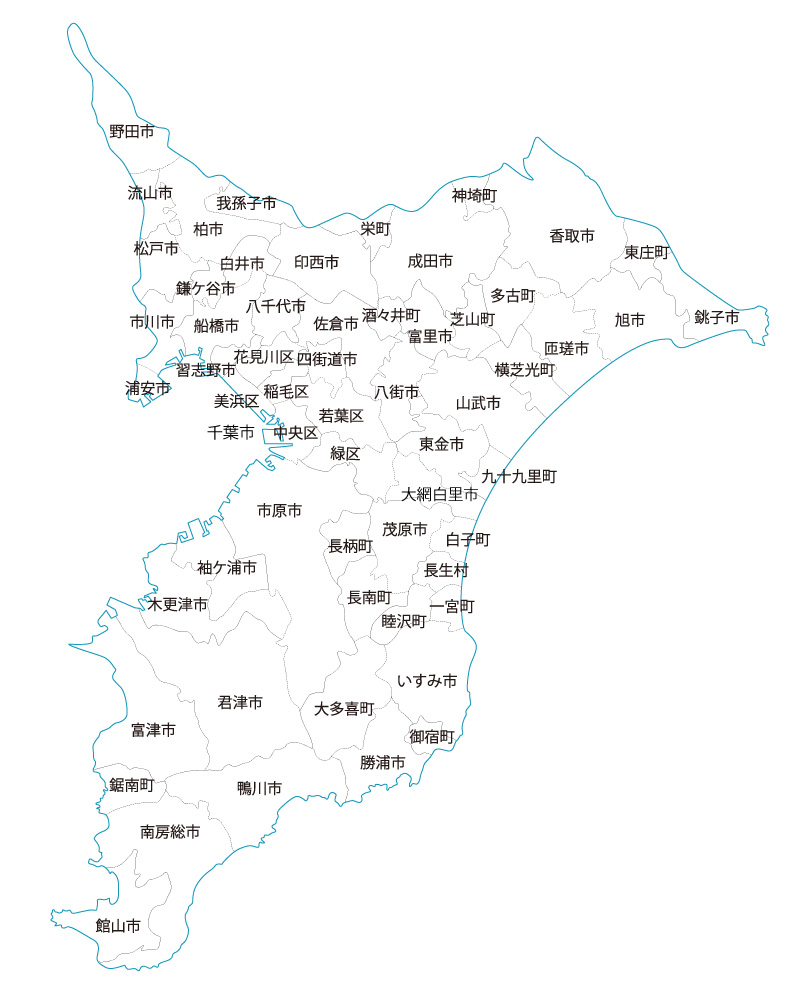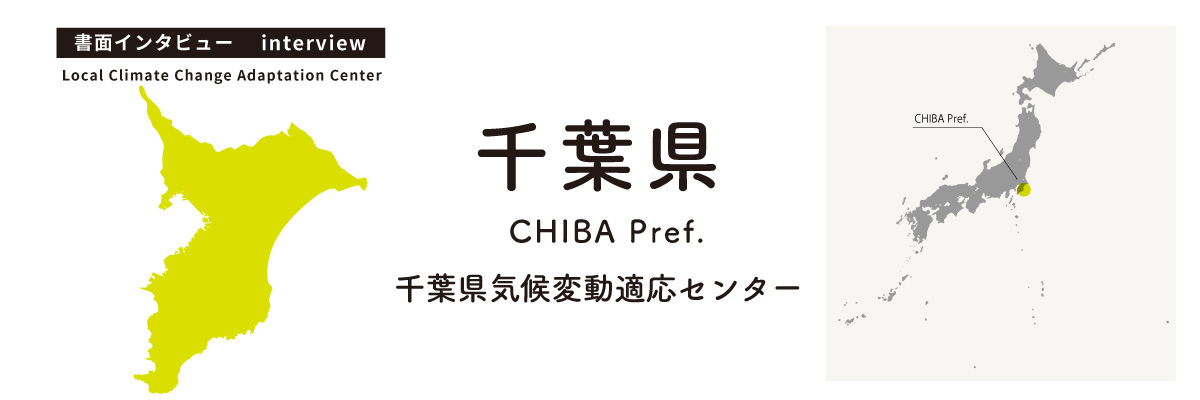Please tell us about Chiba Prefecture’s unique local features and characteristics, what led to the establishment of the Local Climate Change Adaptation Center, and what its organizational structure is like.
Chiba Prefecture is surrounded by the sea on three sides and has a temperate climate. Its topography mostly consists of flat terrain except for the Boso Hill Range comprised of a series of mountains, and the prefecture’s average altitude is 45 m, qualifying it as the lowest prefecture in Japan.
The prefectural government formulated its official climate action initiative entitled the Chiba Prefectural Action Plan for Addressing Global Warming in September 2016, in which the prefecture’s commitment to implementing climate change adaptation measures was stated. Then in March 2018, the prefecture detailed its administrative stance and direction on the effects of climate change in various aspects and countermeasure implementation and announced them in the Chiba Prefectural Policy on Climate Change Impact and Adaptation Action to facilitate climate change adaptation according to the aforementioned Action Plan. Chiba Prefecture subsequently recognized this Policy as its statutory climate change adaptation plan in February 2019, as the Climate Change Adaptation Act would come into effect in December of that year.
Along with these social trends, the prefecture decided on April 1, 2020 that the role of its Local Climate Change Adaptation Center as defined in Article 13 of the Climate Change Adaptation Act would be fulfilled by the Chiba Prefectural Environmental Research Center that had been engaged in environmental surveys, research, and information provision, with a view toward properly addressing the effects of climate change and improving its information gathering function, etc.
As for its organizational structure, the Climate Change Adaptation Center is fully staffed by the Environmental Research Center’s employees whose jobs include the gathering, organizing, and provision of information related to climate change impact and adaptation, and the sharing of such information with other research institutes, etc.

Please tell us about the current activities of Chiba’s Local Climate Change Adaptation Center as well as its future plans.
As for its activities, the Local Climate Change Adaptation Center has been gathering and organizing information on climate change impact and adaptation by sharing and exchanging information and opinions with other concerned organizations, and has been providing information to prefectural residents in digestible formats by publication on prefectural websites, dispatching expert instructors, and participating in exhibitions and other related events.
In addition, the Center also opened its YouTube channel (environmental information channel) in June 2018 to improve understanding of environmental issues by providing videos that inform the public on climate change and other environmental topics. For FY 2021, we have been producing videos on climate change impact and adaptation focusing on three particular themes, which are the problem of climate change explained for elementary school students’ fun learning, predicted impacts of climate change on Chiba Prefecture, and sample cases of climate change actions by private enterprises and citizens’ groups that are based in Chiba Prefecture. Once the video production is completed, the new content will be posted on our environmental information channel.
We are planning to target youth in the future so that they will be able to start thinking for themselves about what actions should be taken, while promoting public education and awareness on the topic.
Furthermore, we conducted questionnaire surveys and other assessment of 12 prefectural high schools to learn how they were dealing with hyperthermia, which asked the school administrators about the effects of global warming being experienced at operational level and what specific measures were being taken to mitigate the risk of hyperthermia at their schools. We are currently sorting and tabulating survey responses.
Please tell us about any unique approach that your Local Climate Change Adaptation Center is taking to effectively coordinate with other departments of the Chiba Prefectural Government and to facilitate adaptation by the prefecture and businesses, as well as any issues, etc. you are experiencing.
Effective climate change action entails both mitigative and adaptive measures, the former mainly being the suppression of greenhouse gas emissions and the latter being the avoidance and reduction of the damage caused by global warming. The Chiba Prefectural Climate Change Adaptation Center has been conducting such activities, including hosting of climate change adaptation seminars for prefectural residents so that they could easily understand what kinds of measures should be implemented, in conjunction with Recycling Society Promotion Division of the prefectural government that oversees global warming countermeasures and other initiatives. In addition, we have been facilitating cooperation with research institutes specializing in agriculture and fishery that would be heavily impacted by climate change to promote information sharing, etc.
As for our coordination with other departments of the Chiba Prefectural Government, Recycling Society Promotion Division has mainly been leading the charge, so the results of measures and activities implemented by each concerned department are reported to them each year and shared with the rest of departments to enhance our interdepartmental coordination.
Furthermore, the Climate Change Adaptation Center and various municipalities within the prefecture have been exchanging ideas and opinions and examining the feasibility of running collaborative projects together. In terms of business operators, we are still contemplating how we might be able to facilitate cooperation with them in the future.
Please tell us what motivates you to do your current work and also your outlook on the future.
In the Sixth IPCC Assessment Report which was published in August 2021, the scientists concluded that human activity had been unequivocally and indisputably responsible for the warming of the planet – its atmosphere, oceans, and land. The landmark study also estimated that if the world could achieve carbon neutrality by 2050, we might stand a better chance of being able to keep the rise in global temperatures at around 1.5°C. To help achieve such goal, it would be crucial that each prefectural resident strive to reduce greenhouse gas emissions, while becoming more interested in, and achieving a better understanding of, how we must collectively adapt to the unavoidable effects of climate change, and adjust our behavior accordingly.
We remain committed to doing our jobs well so that Chiba Prefecture can maintain its environment where the next generation of our children will be able to lead fulfilling and secure lives.
(Posted on February 18, 2022)


